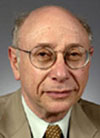Post Date: November 22, 2006
In a recent annual meeting of the American Society for Legal History, HLS Professor Morton Horwitz ’67 was unanimously confirmed as an honorary fellow, the highest honor the society can give a legal historian in North America.
Founded in 1956, The American Society for Legal History is a nonprofit membership organization dedicated to fostering scholarship, teaching and study concerning the law and institutions of all legal systems. According to society bylaws, only 15 living fellows can be confirmed, and the society rarely fills its ranks.
“While I’m sure that different members of the ASLH Committee on Honors who recommended the award, and the Board of Directors who approved it, would emphasize different aspects of Morty’s career, I think it’s fair to say that two things stand out in everyone’s mind: First, ‘The Transformation of American Law, 1780-1860’ and ‘The Transformation of American Law, 1870-1960: The Crisis of Legal Orthodoxy’ were themselves transformative,” said HLS Professor Charles Donahue Jr., current president of the ASLH. “Second, the ranks of American legal historians today are full of Morty’s students, many of whom were in the room when he received the award.”
Donahue added that Horwitz joins only 12 other living legal historians who have been so honored, including such distinguished scholars as Lawrence Friedman of Stanford, R. H. Helmholz of Chicago, John T. Noonan Jr., of the Ninth Circuit Court of Appeals and the University of California at Berkeley, and John Phillip Reid of New York University.
Currently the Charles Warren Professor of American Legal History, Horwitz began teaching at Harvard Law School in 1970 and received tenure in 1974. The first book cited by Donahue, “The Transformation of American Law, 1780-1860,” was published in 1977 and is considered one of the most well-known books on American legal historiography. Horwitz’s law history lectures are often standing-room only at the HLS campus.
To read a related story on Horwitz, including an National Public Radio profile, please click here .
